The hybrid sleeve cartridges market will increase from USD 1.4 billion in 2025 to USD 2.7 billion by 2035, registering a CAGR of 6.8%. Growth is supported by the transition to hybrid material designs that combine paper, biopolymers, and recycled plastics. The hybrid sleeve cartridge market is being shaped by a shift toward mixed-material constructions that improve structural strength, refillability, and overall packaging performance. Growth from 2025 to 2035 is supported by wider acceptance of sleeves that combine paper, biopolymers, and recycled plastic layers to deliver a balance of rigidity, barrier behavior, and brand-level design flexibility. These hybrid formats are gaining recognition across cosmetics, personal care, and wellness categories where shelf appeal and controlled dispensing matter. Converters are working on advanced paper-plastic composites and bio-laminate structures that offer improved forming behavior, reduced weight, and smoother compatibility with automated filling systems.
Between 2025 and 2030, interest in hybrid sleeves is expected to rise as material engineering advances and brands seek packaging that maintains quality while reducing excess resin use. Asia Pacific is positioned to lead manufacturing due to strong converting clusters, developed supply chains, and higher export activity. North America and Europe will focus on compliance-driven design work, precision forming, and material consistency to meet packaging norms. Hybrid combinations that use reinforced paper wraps, molded biopolymer joins, and optimized plastic cores are likely to gain stronger traction across high-volume categories. Key companies include CCELL by SMOORE, UKETA India, iKrusher, DICAN Technologies, EGreensVape, ASM Group, RELEAFY, InterEar Industries, Artrix Global, and Active VapeTech.
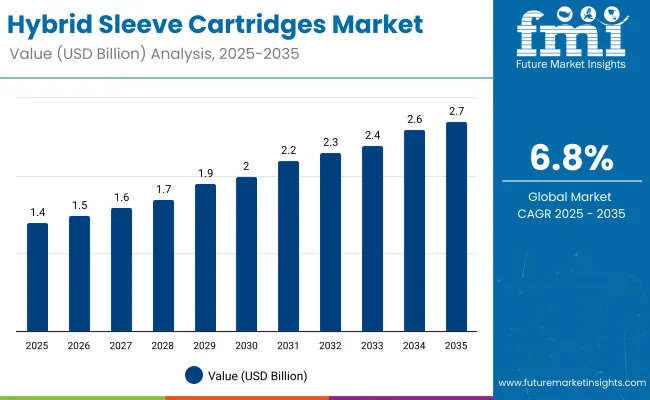
| Metric | Value |
|---|---|
| Industry Size (2025E) | USD 1.4 billion |
| Industry Value (2035F) | USD 2.7 billion |
| CAGR (2025 to 2035) | 6.8% |
From 2020 to 2024, sustainable packaging trends and the rise of refill culture shaped the evolution of hybrid cartridge systems. Manufacturers shifted toward biodegradable liners, reducing single-use waste and improving circularity. By 2035, the market is expected to achieve USD 2.7 billion, supported by product standardization in cosmetics, healthcare, and food concentrate packaging. Asia-Pacific and Japan will lead innovations in hybrid laminate technologies, while Europe will emphasize recyclability certifications and reduced carbon footprints.
Rising environmental awareness and demand for refillable cosmetic and personal care products are key growth drivers. Hybrid materials balance functionality, appearance, and sustainability, meeting performance standards without compromising recyclability. Rapid adoption in consumer and healthcare sectors strengthens market presence globally.
The market is segmented by material combination, cartridge type, application, end-use industry, and region. Material combinations include paper-plastic composites, paper-aluminum hybrids, bio-polymer-fiber laminates, and recycled plastic-cardboard hybrids. Cartridge types cover liquid refill, gel and cream, and powder dispenser cartridges. Applications include personal care, household products, food and beverage concentrates, and pharmaceuticals. End-use industries include cosmetics and personal care, household goods, food and beverages, and pharmaceuticals and healthcare.

Paper-plastic composites are projected to account for 37.6% of the market in 2025, valued for their ability to combine the strength and texture of paper with the protective barrier of plastic. This blend delivers durability, flexibility, and moisture resistance suited for premium refill packaging.
Their recyclability and reduced plastic content align with evolving sustainability standards. These materials are gaining traction in cosmetics, home care, and personal hygiene products where both aesthetics and performance are vital. As eco-conscious consumers favor hybrid packaging, paper-plastic composites continue to lead material innovation.
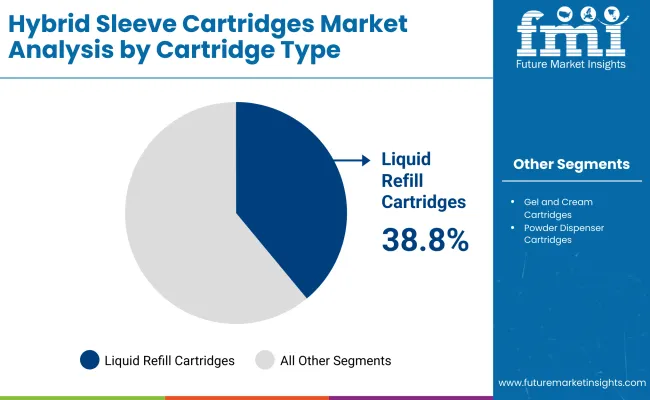
Liquid refill cartridges are expected to capture 38.8% of the market in 2025, driven by expanding use in beauty and household liquid applications. Their resealable structure minimizes waste while enabling repeated refills without compromising product integrity.
Adoption is supported by e-commerce distribution and retail refill station models. Cartridges reduce shipping costs and carbon footprint compared to rigid containers. As circular packaging ecosystems grow, liquid refill cartridges remain central to sustainable, user-friendly dispensing systems.

The personal care and cosmetics segment is forecast to represent 39.3% of the market in 2025, as brands transition to refillable systems to reduce single-use packaging. Hybrid paper-plastic designs offer aesthetic appeal, tactile quality, and structural strength ideal for skincare and fragrance products.
Customization and branding potential further enhance consumer experience and brand differentiation. Global beauty companies are investing in eco-friendly materials to meet regulatory goals. As refill culture reshapes premium packaging, this segment continues to lead market demand.

The cosmetics and personal care sector is expected to dominate with 43.1% of the market in 2025, reflecting strong sustainability pledges and evolving regulatory frameworks promoting recyclability. Major beauty brands are introducing hybrid refill formats to replace traditional plastic bottles and jars.
Investment in lightweight, recyclable materials reduces waste while preserving luxury design aesthetics. The shift toward reusable containers supports circular economy initiatives. As consumer awareness and brand accountability rise, the cosmetics and personal care segment remains the driving force of this market.
The market is being driven by a growing shift toward sustainable hybrid packaging solutions that combine the benefits of multiple materials for enhanced performance. Increasing consumer adoption of refillable dispensers and eco-friendly formats supports this trend. Hybrid packaging offers durability, shelf appeal, and reduced material use, making it attractive across personal care, household, and food & beverage sectors seeking sustainable differentiation.
Growth is restrained by complex recycling processes associated with multi-material structures. The separation of plastic, paper, and metal components remains technically challenging, often limiting recyclability in conventional systems. High manufacturing and sorting costs further add to the environmental and operational burden. These constraints hinder large-scale adoption, especially in markets with underdeveloped recycling infrastructure.
The integration of smart refilling systems and biodegradable hybrid materials is creating new growth avenues. Advances in digital packaging technologies allow real-time tracking, authentication, and consumer engagement for refillable models. Research into renewable hybrid laminates and compostable layers offers opportunities for circular packaging development. These innovations support brand commitments to waste reduction and closed-loop material recovery.
The market is witnessing expansion in bio-laminate materials that combine strength with biodegradability. Digital traceability tools embedded in hybrid packaging are enhancing supply chain transparency and consumer awareness. Lightweight, refillable designs are gaining traction in cosmetics and home care, reducing material usage and transportation emissions. Collectively, these trends are positioning hybrid packaging as a key enabler of sustainable, smart, and consumer-driven product ecosystems.
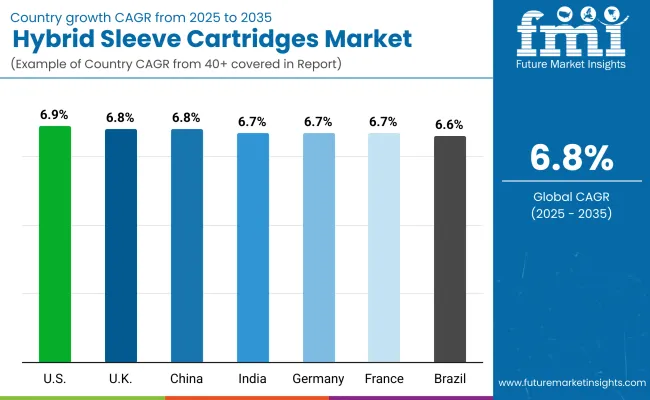
The hybrid sleeve cartridges market is expanding as sustainability and refillable packaging systems reshape the global beauty and personal care industry. Asia-Pacific leads production with advanced hybrid manufacturing and cost-efficient material integration. Europe emphasizes regulatory compliance and circular economy practices through eco-friendly refill systems, while North America focuses on brand-led packaging innovation to align with consumer demand for sustainable luxury products. Increasing adoption in cosmetics, household care, and food-grade dispensing applications continues to drive steady global growth.
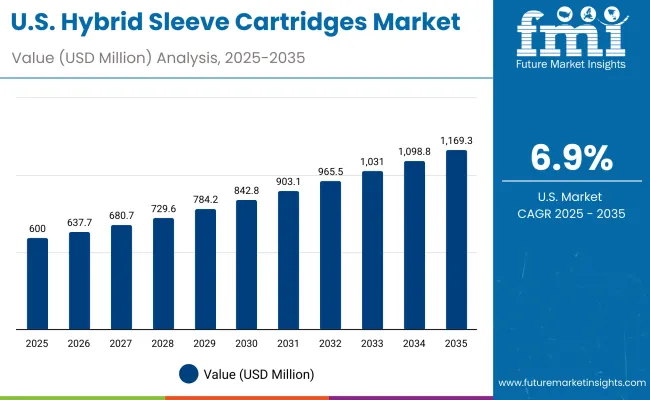
The USA will grow at 6.9% CAGR, driven by the rising popularity of eco-luxury cosmetics and sustainable refilling formats. Major packaging suppliers are expanding hybrid composite production to serve premium personal care and household sectors. Partnerships between beauty brands and dispenser manufacturers are strengthening circular refill models.
Germany will expand at 6.7% CAGR, focusing on eco-friendly laminates and recyclable hybrid cartridge designs. EU sustainability mandates are accelerating adoption of biodegradable packaging formats across cosmetics and home care industries. Material R&D remains a key growth catalyst.
The UK will grow at 6.8% CAGR, fueled by the rise of refill-oriented beauty and household brands. Manufacturers are integrating biodegradable inner coatings and lightweight hybrid designs to meet both sustainability goals and consumer convenience standards.
China will grow at 6.8% CAGR, backed by large-scale hybrid cartridge manufacturing capacity and export competitiveness. Local producers are diversifying applications into food-grade and personal care refills, supported by domestic demand for sustainable, cost-effective packaging solutions.
India will grow at 6.7% CAGR, supported by strong demand from mid-tier beauty and hygiene brands adopting refill packaging. Collaboration with global cosmetic companies is increasing, while government-led initiatives promote paper-plastic hybrid alternatives for sustainable use.
Japan will grow at 7.5% CAGR, leading in high-precision hybrid cartridge innovation. Strong R&D in biodegradable laminates and integration with smart dispensing technology drive premium packaging advancements, particularly in the beauty tech sector.
South Korea will lead with 7.6% CAGR, driven by advanced hybrid cosmetic packaging design and global export growth. Integration of refill technology in skincare and fragrance packaging is accelerating adoption among luxury and K-beauty brands.
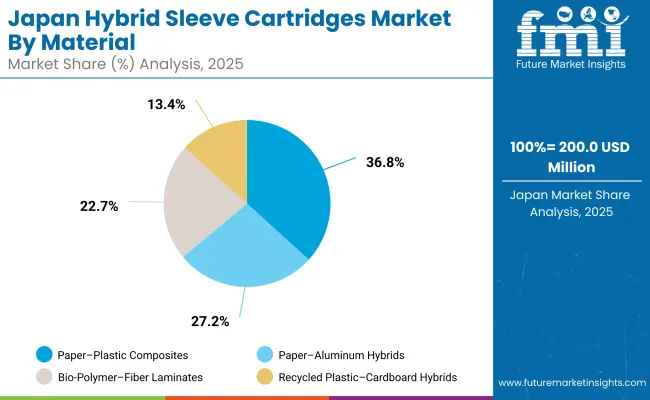
Japan’s hybrid sleeve cartridges market, valued at USD 200.0 million in 2025, is dominated by paper-plastic composites, holding 36.1% share for their recyclability and print adaptability. Paper-aluminum hybrids enhance barrier properties for sensitive formulations, while bio-polymer-fiber laminates and recycled plastic-cardboard hybrids support lightweight and eco-conscious cartridge packaging trends.
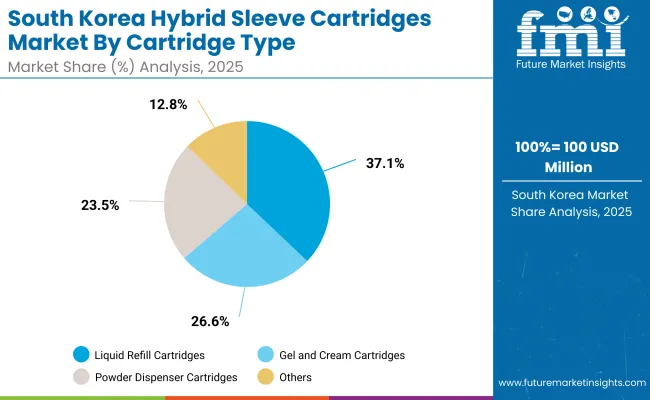
South Korea’s hybrid sleeve cartridges market, worth USD 100.0 million in 2025, is led by liquid refill cartridges, accounting for 38.5% share due to their precision dispensing in cosmetics and pharmaceuticals. Gel and cream cartridges cater to personal care segments, while powder dispenser cartridges gain use in nutraceutical and cleaning product applications.
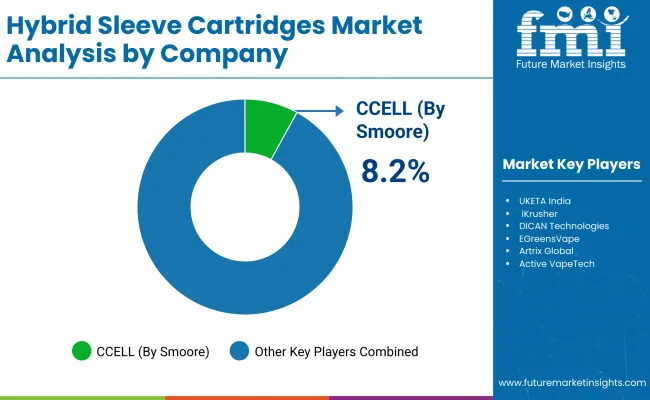
The market is moderately consolidated, with major players such as CCELL (by SMOORE), UKETA India, iKrusher, DICAN Technologies, EGreensVape, ASM Group, RELEAFY, InterEar Industries, Artrix Global, and Active VapeTech. Companies emphasize recyclable hybrid structures, refillable design integration, and next-generation barrier laminates.
| Item | Value |
|---|---|
| Quantitative Units | USD 1.4 Billion (2025) |
| By Material Combination | Paper-Plastic Composites, Paper- Aluminum Hybrids, Bio-Polymer- Fiber Laminates, Recycled Plastic-Cardboard Hybrids |
| By Cartridge Type | Liquid Refill, Gel & Cream, Powder Dispenser |
| By Application | Personal Care, Household, Food & Beverage, Pharmaceutical |
| By End-Use Industry | Cosmetics & Personal Care, Household, Food & Beverage, Pharmaceuticals |
| Key Companies Profiled | CCELL (by SMOORE), UKETA India, iKrusher, DICAN Technologies, EGreensVape, ASM Group, RELEAFY, InterEar Industries, Artrix Global, and Active VapeTech |
| Additional Attributes | Market driven by hybrid sustainability, refill innovation, and circular packaging adoption |
The market is valued at USD 1.4 billion in 2025, driven by hybrid packaging adoption and eco-friendly material innovation.
It will reach USD 2.7 billion by 2035, supported by increased refill packaging adoption across industries.
The market is projected to grow at a CAGR of 6.8% over the forecast period.
Paper-Plastic Composites dominate with a 37.6% share, favored for durability and recyclability.
The Cosmetics and Personal Care sector leads with 43.1% share, driven by eco-conscious product lines and refill culture.






Our Research Products

The "Full Research Suite" delivers actionable market intel, deep dives on markets or technologies, so clients act faster, cut risk, and unlock growth.

The Leaderboard benchmarks and ranks top vendors, classifying them as Established Leaders, Leading Challengers, or Disruptors & Challengers.

Locates where complements amplify value and substitutes erode it, forecasting net impact by horizon

We deliver granular, decision-grade intel: market sizing, 5-year forecasts, pricing, adoption, usage, revenue, and operational KPIs—plus competitor tracking, regulation, and value chains—across 60 countries broadly.

Spot the shifts before they hit your P&L. We track inflection points, adoption curves, pricing moves, and ecosystem plays to show where demand is heading, why it is changing, and what to do next across high-growth markets and disruptive tech

Real-time reads of user behavior. We track shifting priorities, perceptions of today’s and next-gen services, and provider experience, then pace how fast tech moves from trial to adoption, blending buyer, consumer, and channel inputs with social signals (#WhySwitch, #UX).

Partner with our analyst team to build a custom report designed around your business priorities. From analysing market trends to assessing competitors or crafting bespoke datasets, we tailor insights to your needs.
Supplier Intelligence
Discovery & Profiling
Capacity & Footprint
Performance & Risk
Compliance & Governance
Commercial Readiness
Who Supplies Whom
Scorecards & Shortlists
Playbooks & Docs
Category Intelligence
Definition & Scope
Demand & Use Cases
Cost Drivers
Market Structure
Supply Chain Map
Trade & Policy
Operating Norms
Deliverables
Buyer Intelligence
Account Basics
Spend & Scope
Procurement Model
Vendor Requirements
Terms & Policies
Entry Strategy
Pain Points & Triggers
Outputs
Pricing Analysis
Benchmarks
Trends
Should-Cost
Indexation
Landed Cost
Commercial Terms
Deliverables
Brand Analysis
Positioning & Value Prop
Share & Presence
Customer Evidence
Go-to-Market
Digital & Reputation
Compliance & Trust
KPIs & Gaps
Outputs
Full Research Suite comprises of:
Market outlook & trends analysis
Interviews & case studies
Strategic recommendations
Vendor profiles & capabilities analysis
5-year forecasts
8 regions and 60+ country-level data splits
Market segment data splits
12 months of continuous data updates
DELIVERED AS:
PDF EXCEL ONLINE
Hybrid Reactive Power and Harmonic Compensation Device Market Size and Share Forecast Outlook 2025 to 2035
Hybrid Vision Sensor Chips Market Size and Share Forecast Outlook 2025 to 2035
Hybrid Printing Market Forecast Outlook 2025 to 2035
Hybrid Boat Market Size and Share Forecast Outlook 2025 to 2035
Hybrid Metal-Paper Seamers Market Size and Share Forecast Outlook 2025 to 2035
Hybrid Sealing-Cut Machines Market Analysis - Size and Share Forecast Outlook 2025 to 2035
Hybrid Powertrain Market Size and Share Forecast Outlook 2025 to 2035
Hybrid Additive Manufacturing Machines Market Size and Share Forecast Outlook 2025 to 2035
Hybrid Integration Platform Market Size and Share Forecast Outlook 2025 to 2035
Hybrid Marine Gensets Market Size and Share Forecast Outlook 2025 to 2035
Hybrid Meat Products Market Size and Share Forecast Outlook 2025 to 2035
Hybrid Generator Sets Market Size and Share Forecast Outlook 2025 to 2035
Hybrid Switchgear Market Size and Share Forecast Outlook 2025 to 2035
Hybrid Rice Seeds Market Size and Share Forecast Outlook 2025 to 2035
Hybrid Memory Cube Market Size and Share Forecast Outlook 2025 to 2035
Hybrid Aircraft Market Size and Share Forecast Outlook 2025 to 2035
Hybrid Solar Wind Market Size and Share Forecast Outlook 2025 to 2035
Hybrid Cutters Market Analysis Size and Share Forecast Outlook 2025 to 2035
Hybrid Fabrics Market Size and Share Forecast Outlook 2025 to 2035
Hybrid Train Market Analysis - Size, Share, and Forecast Outlook 2025 to 2035

Thank you!
You will receive an email from our Business Development Manager. Please be sure to check your SPAM/JUNK folder too.
Chat With
MaRIA